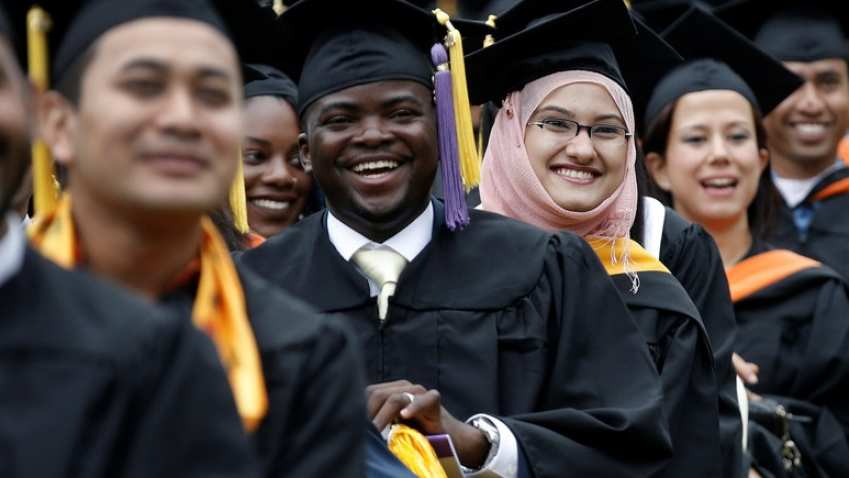NEW YORK: Malaysian students interested in pursuing higher education at a university or institution of learning in the United States need to familiarise themselves of the changes being made in the US visa policy which has become more restrictive.
Asian students, including from Malaysia, find it attractive to study subjects such as engineering, computer sciences, highly specialised branches of medicine, etc. in the US.
The Stevens Institute of Technology in Hoboken, New Jersey, attracts a large Asian student population, particularly from China, India and, increasingly, from Malaysia. China, India and South Korea account for some 56.1% of all foreign students studying in the US.
“I am worried, to be honest, by the restrictions announced for students wanting to study in the United States ... my dream has been to study in the US.
After I complete my education, I would like to gain some practical experience by working with a US company for sometime before I return to Malaysia. Will the new visa policy deny me what has been a long tradition followed by foreign students who are happy to get some practical training before returning to their native country?” a Malaysian student who wished not to be named told Bernama.
For 2017/2018, according to the Statistics Portal, the largest number of students in the US came from China (363,431) and India (196,271). Malaysia, with 8,271, was the second largest source of students from the Asean region after Indonesia (8,650).
Meanwhile, fearing that the new restrictions would deter foreign students from coming to the US to pursue higher education, 65 US universities, including big names such as Harvard and MIT, have taken up cudgels for foreign students, and joined hands to challenge in court Trump’s new restrictive visa policy governing foreign students.
The universities and colleges warn that the new restrictions will spell long-term damage for the country’s education system, with foreign students seeking higher education in Canada, United Kingdom and Australia.
Indeed, Harvard released last Friday an “amicus brief” voicing objections against US visa policy changes announced in August restricting visa overstay rules for foreign students, and opposed US revision of rules for calculating unlawful stay time for visa-holding students.
The amicus brief supports Guilford College and others in the lawsuit against US Secretary of Homeland Security Kirstjen M. Nielsen.
The plaintiffs called for a temporary hold on new immigration policies that place restrictions on overstaying a visa.
Under new immigration policies, when an individual is no longer authorised to remain in the US – e.g. when a visa expires – a period of “unlawful presence” begins. After six months of unlawful presence, an individual can be forced to return to their country of origin and subject to a three-year bar from the US
Prior to the August policy change, individuals only started maintaining an unlawful presence the day after the government officially determines that the visa holder was “out of status”.
With the new rules, the Department of Homeland Security (DHS) can set retroactive start dates for unlawful presence beginning the day after an individual’s degree programme is completed or the day after a person’s visa expires.
The move would also economically hurt the US Universities and institutions of learning.
These institutions reap immense economic benefits from foreign students.
According to the Association of International Educators (Nafsa), international students contributed over US$37 billion (RM154 billion) to the US economy in 2017, creating more than 450,000 jobs, with every seven international students supporting three US jobs.
But there is widespread consensus that the foreign students’ most valuable contribution is the intellectual capital.
Foreign students who studied at US universities and then made significant economic and social contributions include Tesla and SpaceX chief executive officer (CEO) Elon Musk, Google CEO Sundar Pichai, and journalist Fareed Zakaria who is highly respected among the US and international viewers.
A study of American startup companies with a value of US$1 billion (RM4 billion) or more, pointed out that nearly one-quarter of such businesses had a founder who first came to the US as an international student.
The backdating rule introduces significant uncertainty and punishes students for reasons that are frequently beyond the students’ control. Sometimes, students and exchange visitors can fall out of status because of clerical and technical errors, often because of someone else’s making.
Meanwhile, the number of foreign students seeking admission to US universities and other institutions has fallen for the second successive year. According to the Institute of International Education, new foreign student registrations for the 2017/18 school year fell 6.6% over 2016/17 when the number had declined by 3.3%.
Analysts specialising in education and immigration attribute the decline to the visa and immigration changes made by the Trump administration.
The decline was further aided by a strong dollar making US education more expensive for foreign students. — Bernama














